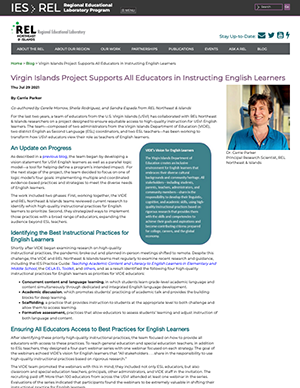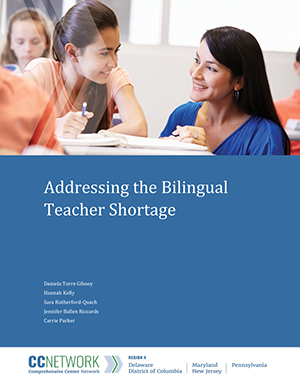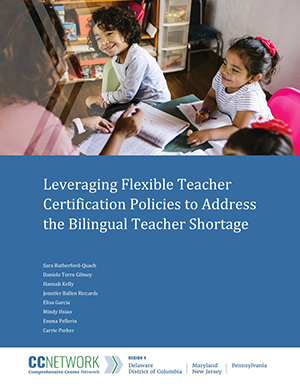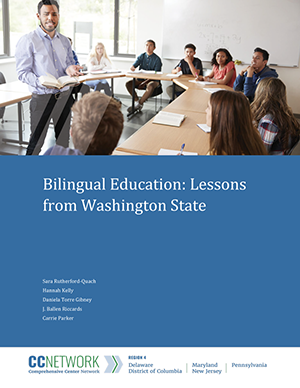The language we use affects the way we perceive our world. Language can help create new understandings and expand our view of what exists and what is possible, and it also can limit our understanding. The terms we use to describe students who speak two or more languages or speak a language other than English at home, for example, impacts how we envision and develop programs and policies for those students.
This report shares findings from a survey conducted with Newcomer students, defined as individuals attending schools in the United States for three years or less and who speak a language other than English at home, in Oakland Unified School District. The survey was designed to inform the work of the Newcomer Wellness Initiative, a program … Continue reading Newcomer Wellness Initiative 2019-20 Evaluation Report
Margarita Muñiz Academy in Boston, MA, was founded in 2012 with the mission of providing full cultural and linguistic fluency in Spanish and English for all of its students. The school’s development of its “Portrait of a Scholar” project led to a number of changes focused on providing greater opportunities for student voice and participation. … Continue reading Think Forward New England: Profiles of Innovation | Margarita Muñiz Academy
Resource: Schools supporting multilingual learners
We spoke with teachers and administrators in three New England districts with large numbers of multilingual learners about how the pandemic influenced student learning and teaching practice last year.
The Adapting and Innovating Project examined the experiences of students, teachers and administrators across New England districts during the 2020-2021 school year to better understand how they responded to COVID. The work included an Innovation Profile of the Maria Muniz Academy, the only dual language high school in Boston, as well as a blog summarizing … Continue reading Think Forward New England: New England’s Education Systems Navigate COVID-19 and Map a New Way Forward
For the last two years, a team of educators from the U.S. Virgin Islands (USVI) has collaborated with REL Northeast & Islands researchers on a project designed to ensure equitable access to high-quality instruction for USVI English learners. The team—composed of two administrators from the Virgin Islands Department of Education (VIDE), two district English as … Continue reading REL Northeast & Islands Virgin Islands English Learner Project
The purpose of this Region 4 Comprehensive Center project was to support the New Jersey Department of Education to expand their preparation pipeline for certified bilingual teachers. The project culminated in a series of publically available briefs focused on bilingual education programs across the country, including when and how they are implemented, strategies to address … Continue reading Mid-Atlantic Comprehensive Center Bilingual Teacher Project
From 2017 to 2020, REL Northeast & Islands staff worked with state and local partners in the region to learn about the policies and practices they use to identify disabilities among English learners and to provide resources to implement key policies and practices at the district, school, and classroom levels. » Learn more Project Leaders: … Continue reading REL Northeast & Islands Identifying Disabilities among English Learners
This blog introduces a series of policy briefs that were developed in collaboration with the New Jersey Department of Education to better understand the state of bilingual education across the country, potential strategies to address the shortage of bilingual educators, and approaches to bilingual education policy and programming. View Resource Citation: Rutherford-Quach, S., Kelly, H., … Continue reading Examining Bilingual Programs and Policies
This blog describes a two-year project in collaboration with the Virgin Islands Department of Education to ensure that all educators have access to best practices for English learners. View Resource Citation: Parker, C.E. (2021). Virgin Islands Project Supports All Educators in Instructing English Learners. Regional Educational Laboratory Northeast & Islands. Retrieved from https://ies.ed.gov/ncee/edlabs/regions/northeast/Blog/Post/35 Related Project: … Continue reading Virgin Islands Project Supports All Educators in Instructing English Learners
In this brief, the authors share strategies that can help mitigate bilingual teacher shortages and provide considerations for state and district leaders who are interested in addressing these shortages. View Resource Citation: Torre Gibney, D., Kelly, H., Rutherford-Quach, S., Ballen Riccards, J. & Parker, C. (2021). Addressing the bilingual teacher shortage. CCNetwork. Related Project: Mid-Atlantic … Continue reading Addressing the Bilingual Teacher Shortage
Resource: Leveraging Flexible Teacher Certification Policies to Address the Bilingual Teacher Shortage
In this brief, the authors share strategies that state education agencies may use to provide more flexibility in teacher certification policies and thereby mitigate bilingual teacher shortages, including: 1) providing educators multiple pathways to certification, 2) offering prospective teachers a menu of certification requirements, 3) allowing educators to earn probationary certifications, and 4) creating flexible … Continue reading Leveraging Flexible Teacher Certification Policies to Address the Bilingual Teacher Shortage
In this brief, the authors describe Washington state’s approach to bilingual education and detail the ways in which state leaders have leveraged policy and funding to expand access to it. They also offer specific policy considerations for strengthening bilingual education and developing bilingual educators in states across the country. View Resource Citation: Rutherford-Quach, S., Kelly, … Continue reading Bilingual Education: Lessons from Washington State







